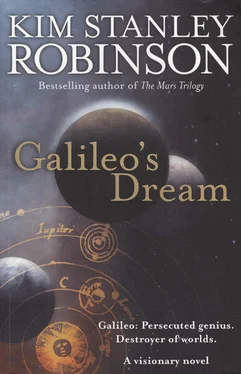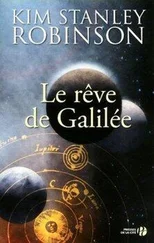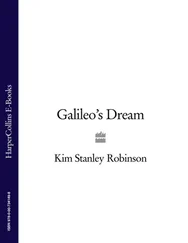* * *
With the Discorsi sent off to Holland, he fell back into melancholia. This was not helped by the fact that his right eye, which had spent so many hours jammed against the eyepieces of his telescopes, had begun to fail him. By day he ran tests on the eye as if it were one of his telescopes, taking notes on its reduced field, perspicacity, and sensitivity to light. By night he moaned.
One morning he got up saying that if he went blind he would never be able to see Maria Celeste’s handwriting ever again, never read her thoughts there expressed so clearly that it was as if reading her mind, and he took the basket holding the letters from the side of his bed and began to read through them, holding the pages close to his face, breathing in the scent of them as he read. The big diagonal loops of her handwriting brought all their banter back to him, the years when together they had run both San Matteo and Bellosguardo, keeping accounts and managing both field and household. They brought back also the way she had encouraged him during the trial, even though she had been terrified.
He came on the one that told the story of the time he had sent over to her a basket of game birds, to sweeten the last meals of another young nun, who had wasted away and was dying despite Maria Celeste’s ministrations. She wrote back to him:
I received the pannier containing the twelve thrushes: the additional four, which would have completed the number you state in your letter, Sire, must have been liberated by some charming little kitten who thought of tasting them ahead of us, because they were not there, and the cloth cover had a large hole in it. So, as the thrushes arrived a little the worse for wear, it was necessary to cook them in a stew, so that I stood over them all day, and for once I truly surrendered myself to gluttony.
For once . Surrendering to a stew of birds chewed up by a cat. Galileo put the letters back into their basket.
After some weeks of blackness, I asked if he had heard anything lately from the Lady Alessandra Buonamici, in Germany with her husband. “No,” he said shortly, but later that day he called for some paper. He wrote her a long letter, and after that, he got into the habit of it. Because of the distance between them, he could say things he wouldn’t have said to the people around him; and say other things also without any danger that anything was expected to come of it. So then, often, after his morning in the garden, he sat in the shade of the arcade and wrote a note to her, bundling five or six into a package, and keeping others to himself.
On that first day, in his mind he wrote: How I loved you, dearest lady. You fill my mind to such an extent that it seems you are here with me. You are so beautiful here in my garden, I must say. I am sure it is even more true in Mainz. I wish you were here instead, though I feel the vibration of your presence even over that distance, for I am tuned to the same harmonic. Maybe there is a world in which you did not go to Germany, a world in which things happened differently, so that I could pass more time with you. Not only could have spent time with you, but have; not only have, but am, in some other part of this very moment. That’s the part of the moment I like best. Meanwhile, however, I live on in this world in which I am imprisoned, in which you are in Germany, or somewhere else, and so I must speak to you in my mind only, and here on the page capture just the smallest fraction of the thoughts I have spoken to you in that empty room.
In the last year of his sight, he often sat out in the garden at night on his reclined divan, looking at the moon and what he could see of the stars. He noticed for the first time that although the moon always showed the same face to Earth, it was not exactly the same face; there were small shifts, as if the man in the moon were looking into a mirror and inspecting his face from different angles—which is how Galileo put it when he wrote about the discovery to his friends—first tipping his head down, then up, then left, then right. This might be part of how the moon had its effect on the tides; for his theory, that they were caused not by the moon but by the Earth’s rotation and its movement around the sun, had turned out to be not just heretical, but wrong. The moon seemed to be involved after all; or at least things were happening to both moon and tides in concert. Possibly this shifting face had something to do with it. So hard to tell; but when he understood the reality of this little libration, which no watcher of the moon no matter how vigilant had ever observed in the history of mankind, the little bell inside him rang again.
That bobbing face of the man in the moon was his last observation; soon after that his left eye went too, and then that kind of thing was truly over. A combination of infections and cataracts had blinded him. Only a short time after that, the Vatican sent word that he was allowed to move temporarily into Florence to be seen to by doctors. But it was doubtful they could have done anything, even if they had seen him before.
With his world gone dark, he had to dictate his letters, which continued to go out into the world as before. A young student named Vincenzio Viviani, only seventeen years old, was invited to move into the house as an assistant. He joined us and proved to be a serious young man, intelligent and helpful, very intent on his duties. Galileo spent many an hour talking through his correspondence, and Viviani wrote it all down.
In a letter to Diodati, Galileo said,
This universe, which I with my astonishing observations and clear demonstrations enlarged a hundred, nay, a thousandfold beyond the limits commonly seen by wise men of all centuries past, is now for me so diminished and reduced as to have shrunk to the meager confines of my own body.
When he said gloomy things like this around the household, I would say to him, “It could be worse.”
“Worse?” he would snap. “Nothing could be worse! It would have been better to have been burned at the stake by that liar who went back on his word!”
“I don’t think so, maestro. You wouldn’t have liked the fire.”
“At least it would have been fast. This falling apart, one piece at a time—if only I would trip on a stair and hit my head and be gone. So leave me! Leave me or I’ll kick you. I know where you are.”
He could tell many weeds by feel, and so continued to sit in the garden in the mornings, even when he did nothing but listen to the birds and feel the sun on his face. He got out his lute, had it repaired and re-strung, and started playing it again. As the calluses on his fingers thickened he played it more and more, repeating the songs he knew, and humming or mumbling in a hoarse baritone the words to some of them. He often played a little suite of his father’s compositions, and musical settings for Ariosto and Tasso, and long wandering melodies of his own devise. La Piera ran the house along with Geppo and the other longtime servants. Viviani served as Galileo’s amanuensis. I continued on as his personal servant. A new student, Torricelli, moved in to take mathematics lessons. Things continued in their new way.
And then Alessandra Buonamici came back. She showed up in the spring of 1640, announcing that her husband’s diplomatic assignment had unexpectedly brought him back to Florence. She stood there in his room; she touched him on the arm, let him touch her on the face. “Yes, I’m here,” she said.
* * *
Again Galileo was saved by a stranger appearing at a crux in his life. This time it was Alessandra, nearly forty now, childless, tall, and rotund. She came to visit almost every day, accompanied only by a servant or two. She brought with her gifts for him that he could feel, or eat: rolls of yarn, different fabrics of linen, dried fruits, scraps of blacksmith metal, polygons made of woodblock, chunks of coral. He would sit forward in his chair and rub swatches between his fingers and against his cheek, or stack cubes, and tell her about cohesion and the strength of wood.
Читать дальше
Конец ознакомительного отрывка
Купить книгу












